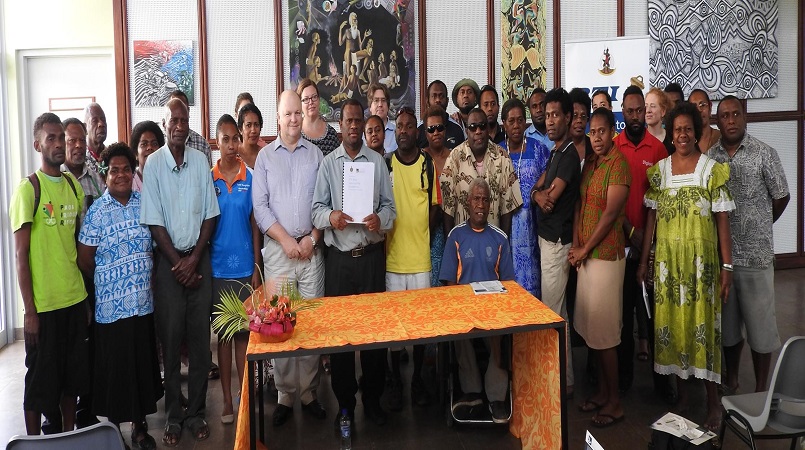
The first National RTI Web Accessibility Guideline for government web developers and web content officers has been officially launched in Port Vila today by the Government’ Chief Information Officer, Gerard Metsan, on behalf of the prime minister.
The launch was held in the Exhibition area of the National Library where the atmosphere was filled with excitement. Amongst those who witnessed the launch are the beneficiaries of the guideline, the people with special needs.
The Web Content Accessibility Guidelines (WCAG) covers a wide range of recommendations for making Web content more accessible. Following these guidelines will make content accessible to a wider range of people with disabilities, including blindness and low vision, deafness and hearing loss, learning disabilities, cognitive limitations, limited movement, speech disabilities, photosensitivity and combinations of these.
When officiating the launch, the Government’s CIO, Gerard Metsan said as the Government progresses in rolling out ICTS and better internet access across this nation, it is imperative that it also ensure it does not only provide the infrastructure, the “Poles and Wires”. “We must also make sure that the services thus provided can be used – and are ‘accessible’ – by everyone”, he told the keen listeners at the launch.
Mr Metsan said Vanuatu has signed up to and ratified international and regional agreements and has national policies which speak to our commitment to help those of our people with special needs, or those who have been marginalised. He said these Accessibility Guidelines are a key step to put into action Vanuatu’s commitments under those international conventions.
‘We ratified the UN Convention on the Rights of Persons with Disabilities in 2008. This convention sets out what States Parties should do to address any forms of discrimination or unequal access faced by people with disabilities. Now, the Government is in the ongoing process of ensuring that people living with a disability in Vanuatu are able to access all services and opportunities available.”
The government’s CIO said today more and more services, information, entertainment and opportunities are being provided online, via computer or mobile phone devices. The Government has been very active in this regard. For example, the work of the NDMO, the Agriculture, Forestries and Lands, and the tele-medicine service just opened on Maewo.
Mr Metsan said his office and the RTI Unit under the portfolio of the prime minister, has put a lot of work on the implementation stage of their responsibilities after realising the fact that the policies on access to information as well as the expansion of ICTs under the Universal Access Policy, cannot really be achieved unless both open up to Access to ICTs and also that all barriers to access information are removed.
“I would like to take this opportunity to thank the Vanuatu Civil Society Disability Network, and all your individual members, Oxfam and also the Australian Government for supporting and being part of this important work in developing the RTI Web Accessibility Guidelines”, said Mr Metsan.
Government’s CIO Metsan also encourages the local and international NGOs, our media organisations and any service providers in Vanuatu to follow the lead of the Government in working towards making “your” online presence accessible, and providing better access to information for all.
These RTI Web Accessibility Guidelines represent the intersection between several policies, the National ICT, Universal Access and RTI policies, the Disability policy and the Children’s policy.
Accessible ICTs open up opportunities for all people who have or can use a smart phone, a tablet, laptop or computer either in the home, at school, workplace, library or other community space.
The manager of the Right To Information (RTI) Unit, under OGCIO, Harold Obed said he was particularly impressed with the positive response from stakeholders during the drafting stage of the guideline.
He said he is hopeful that under these guidelines government websites will now be correctly designed, developed and edited for all users to have equal access to information and functionality.
Digicel was also at the launch site explaining special features already available in the Smart Phones that could assist people with special need.
Australian High Commissioner, Jeremy Bruer was also present to express his gratitude for the project and reiterate his governments continued commitment to assisting people with special ability. The project is funded by a small grant of $1,000AUD (80,000VUV) from the Australian Government through its Australian Volunteers for International Development (AVID) Program. The Project is being undertaken in collaboration with the OGCIO, Oxfam and the Vanuatu Civil Society Disability Network (VCSDN). The Media Association blong Vanuatu (MAV) has also provided input to this project.
Photo: The government’s CIO Mr Metsan and the Australian High Commissioner pose for a photograph with members of the civil society disability network, RTI, MAV, TIV, TRR, OGCIO etc , after the official launch of the RTI Web Accessibility Guideline.
